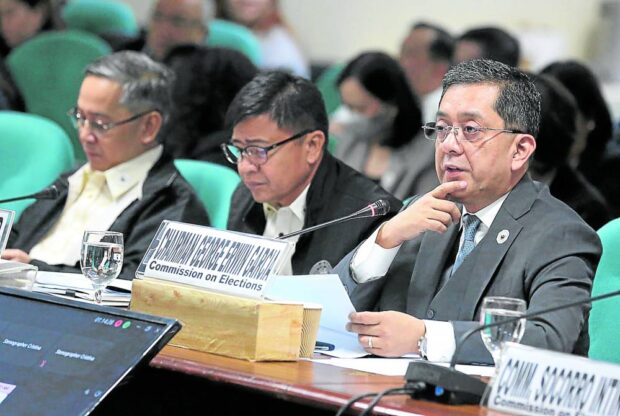
APPEAL Comelec Chair George Erwin Garcia speaks during a Senate budget hearing. —NIÑO JESUS ORBETA
Senators on Thursday directed the Commission on Elections to explain in detail the alleged irregularities in the May 2022 national and local elections following its admission that the bulk of the results were electronically tallied using just one private internet protocol (IP) address.
Senate Minority Leader Aquilino Pimentel III was surprised to learn from the poll body’s officials led by its chair, George Erwin Garcia, that the processing of election results went through a “private gateway”—information that was reportedly not publicly disclosed earlier.
“For laymen like us, was (the use of a private gateway) even necessary? Did it not make auditing more difficult because when we backtrack, we stumble upon a telco [telecommunication company] exchange which, according to experts, could have been a device like a laptop with a private IP address,” Pimentel said. “I’m even in shock now to find out that our entire election system (in 2022) was one large private network,” he added.
Pimentel made the statement as Garcia confirmed the claim of former Information and Communications Technology Secretary Eliseo Rio that more than 20 million votes were electronically derived from private IP address 192.168.0.2.
While defending the Comelec’s proposed P27.3 billion budget for 2024, Garcia was asked by Sen. Imee Marcos, chair of the Senate committee on electoral reforms and people’s participation, about Rio’s allegations that have become a hot topic on social media.
In response, the Comelec chair confirmed that the results from 20,300 precincts were transmitted using a single IP address, but clarified that this did not affect the integrity of the 2022 election results.
READ: Comelec wants to rent vote-counting machines for 2025 midterm polls
READ: Comelec inaugurates Metro Manila office in San Juan
Older technology
Garcia said that the Comelec had to use older 4G (4th generation) modems supposedly because many of those used in the 2016 elections had broken down. This change supposedly was approved by representatives from the poll body’s citizens’ arm, the National Movement from Free Elections, and the Parish Pastoral Council for Responsible Voting.
“The original finding was that 5,700 [modems] were defective and by March [2022], they found out that an additional 15,700 were not working. So Globe Telecom advised us to buy the 4G modems to conform with the latest shift in technology,” Garcia said.
“Fortunately or unfortunately, the IP address used for these modems all used the 192.168 for the 20,300 precincts, distributed in the [National Capital Region], and Cavite, Laguna and Rizal provinces,” he added. Marcos then asked Garcia, “So you are telling us that it’s true that the transmission of the results came from a single IP address? So that is true?”
“For the 20,300 precincts, madam chair,” he replied.
Hearing this, Pimentel expressed alarm over the disclosure, especially with the Comelec’s earlier pronouncements that the transmission of election results used the internet—a claim that Garcia disputed.
“We have long been discussing this matter, and I remember one of the things raised is the possibility of hacking, and (Comelec) dismissed this possibility because the transmission happens only for a split second,” he said. Still, Pimentel raised doubts over Garcia’s explanation.